Top 10 Free & Paid Social Media Analytics Tools
If you’re new to social media marketing, check out some of our previous articles: What is Social Media Marketing? & How to Create a Social Media Marketing Plan
In social media marketing, it is essential to track, measure, and optimise your social media marketing campaigns.
Love it or loathe it, social media analytics are here to stay. By deploying the right social media analytics tools for your business, you are able to track what your competitors are doing, monitor the success of your campaigns, and drive more interest amongst the right target audiences.
In this article, you will uncover the importance of social media analytics, learn what a good social media analytics tool should have, and be introduced to the top 10 social media analytics tools.
Importance of using Social Media Analytics Tools
“You cannot manage what you do not measure” — Peter Drucker. This age-old statement is still relevant in today’s digital-first world where the right data on the right channels drives important business decisions on a day-to-day basis.
(If you have not already done so, do read our article on how you can measure your social media analytics.)
After you have a better idea of what social media analytics are, the following pointers should assist you in better understanding how and why it is important to utilise social media analytics tools.
#1 Track the performance of your marketing goals
Social media analytics allows you to assess how well your brand performs in relation to your marketing objectives. It also compares your social media performance against your competitors’. To truly assess how well your brand is performing, you need to benchmark it against your competitors’ and the average industry performance.
Unsure of your marketing objectives? Give our guide on defining marketing objectives and KPIs a read.
#2 Understand what your audiences prefer
Using the right tools helps you to analyse and track the engagement rate of your brand’s previous posts, allowing you to determine the optimal time to upload your posts on your social media channels. You can also assess which post types are more well-received, and which are less popular amongst your users. This ensures that your content will resonate with the right audiences which will, in turn, boost overall marketing results.
#3 Reveal the ideal social networks to share your content
You can leverage social media analytics to also understand the engagement, traffic and sales that your brand acquires for individual posts and campaigns. You can then focus your attention on social networks that work best, and eliminate or focus less on those that perform poorly.
#4 Understand your brand’s competitors
By legally monitoring and spying on what your competitors are doing on social media, your brand can decide which social networks work better for you. It also prevents you from making the mistakes your competitors are making, allowing you to focus on result-oriented strategies. You can adapt and change your competitors’ best practices to suit your own purpose.
What a Good Social Media Analytics Tool Should Have
The properties of a suitable analytics tool for your brand need to achieve the 5W and 1H (Who, What, Where, When, Why and How) of the litmus test. To get you started, consider the following properties of a good analytics tool.
- Who?
-
- The right demographic and psychographic information on the audience segments engaging with your posts.
- What?
-
- What is your reputation like? What are people saying about your business?
- Where?
-
- Where can you get the best results for your social media campaigns? Which platforms and channels to focus on?
- When?
-
- When is the best time to post? This often hinges on when your audiences are most active online.
- Why?
-
- Why are people engaging with your posts? This may require you to do some investigation, and possibly conduct some A/B/C testing to determine which content types or themes work better.
- How?
-
- How should you improve your social media performance? This is based on the data which the different analytics tools are telling you.
Now that you’ve gained some knowledge on what a good social and digital analytics tool should have, the following list of tools should guide you in kickstarting your social analytics journey.
1. Google Analytics
On top of the list, Google Analytics is one of the best methods in tracking the outcomes of social media campaigns which drives traffic to your website and landing pages. It aids in measuring the social media marketing Return-On-Investment (ROI) as it relates to achieving specific conversion goals on your website.

Measuring Social Values to demonstrate the effectiveness of various social media channels.
Google Analytics tracks your website’s user engagement, including data such as pages per session, bounce rates, and average session length. This helps you to monitor the digital behaviour of your customer’s ABCs :
– Acquisition (which channels do they come from, new versus repeat customer)
– Behaviour (bounce rates, pages per session, and average session duration)
– Conversion (goals completed)
It shows the different sources of social media traffic, thereby providing companies with accurate statistics on which social media networks have the highest number of visitors to the website, as well as their actions afterwards.
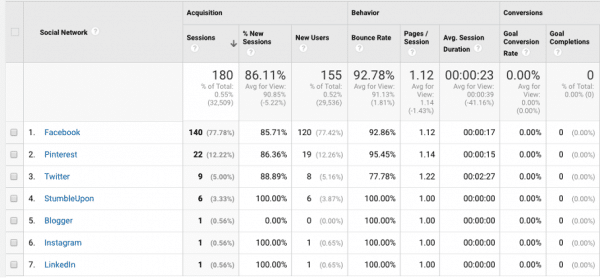
Chart featuring various social media channels with useful data that can greatly assist with the business direction of a company.
Google Analytics also tracks the number of conversions from numerous social media posts. This data on goals completion enables you to assess which social media platforms and campaigns generate the most revenue or profit.
Beyond this, it also presents data on assisted social media conversions. These are interactions that a consumer has with the different social media platforms, contributing to a conversion. It is a crucial method to ascertain the role of social media in the funnel.
2. CoSchedule
CoSchedule enables you to handle multiple social media platforms and distribute content from your website seamlessly. It consists of reports which can be used to convert data into information, enhancing the social media strategy and ROI of your company.
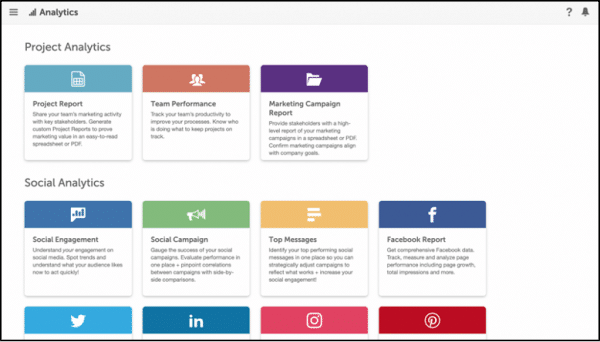
CoSchedule displaying multiple levels of analytics that help steer businesses in the right direction.
With CoSchedule’s Social Engagement Report, it provides businesses with an overview of the growth (or declines) in your social media marketing efforts.
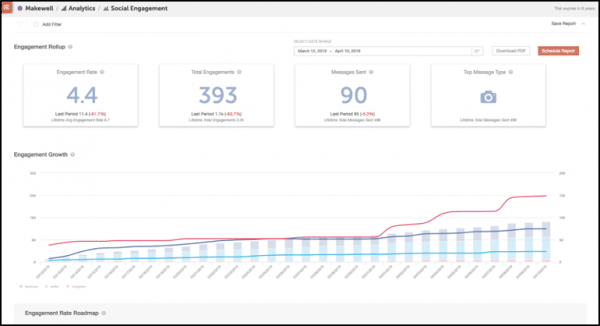
CoSchedule’s Social Engagement showcases engagement growth over a period of time.
CoSchedule also has a feature on the customisation of social reports. This allows you to segment your social performance metrics such as engagement rates and total engagements by different categories.
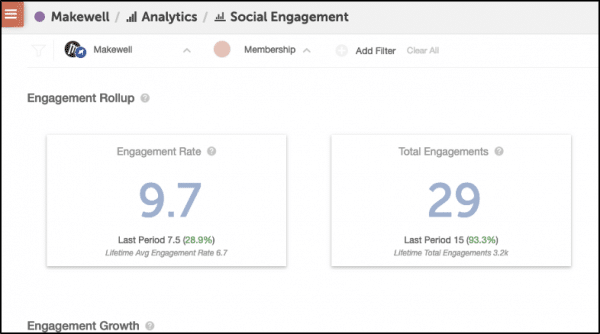
CoSchedule’s example of generating reports on specific initiatives (i.e. promoting membership).
In conjunction with the previously mentioned features, the key to improving is to always track and measure the level of success for your campaign.
CoSchedule can also generate reports which demonstrate the impact of social media marketing on specific campaigns. It does this through allocating a score. Finally, CoSchedule contains features that allow reviews of your social performance on specific channels.
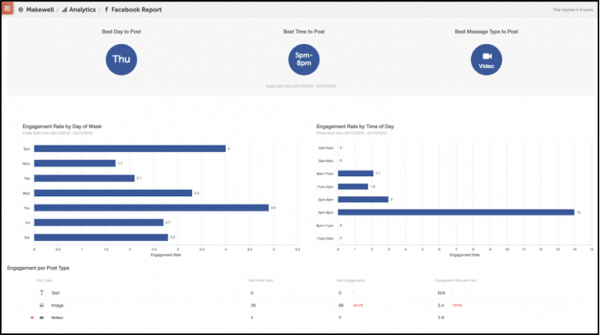
Diagram presenting different profiles (day and time) and message types that perform best on a specific channel.
On top of its wide range of features, CoSchedule has a free 14-day trial and various pricing plans depending on factors such as whether the plan is for an individual, a business or an agency, and the size of the business.
3. Hootsuite
For the best user accessibility, Hootsuite provides a central dashboard view for each social media platform that your brand is on.
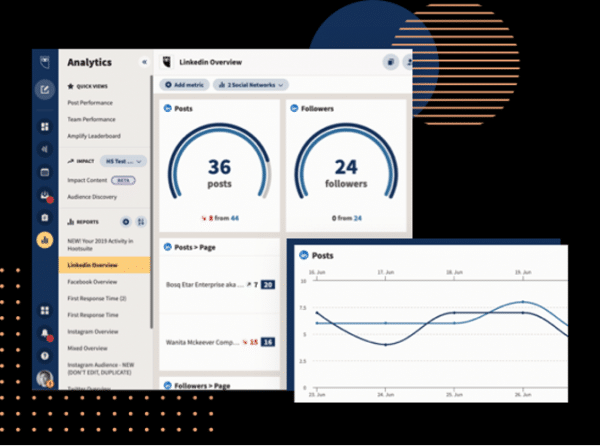
Dashboard overview helps to set performance benchmarks and monitor improvements over time.
With Hootsuite Impact, you can calculate the return on your social media investment in terms of achieving your social media performance goals. This helps to solidify the business case for social media in your organisation.

Dashboard features are customisable to display easy-to-read graphs, tables, and KPI summaries.
Furthermore, it gives businesses the opportunity – through Hootsuite Amplify – to expand their reach by leveraging the social influence of their advocates (employees, influencers or devoted fans). This is done through sharing of approved content on their social networks.
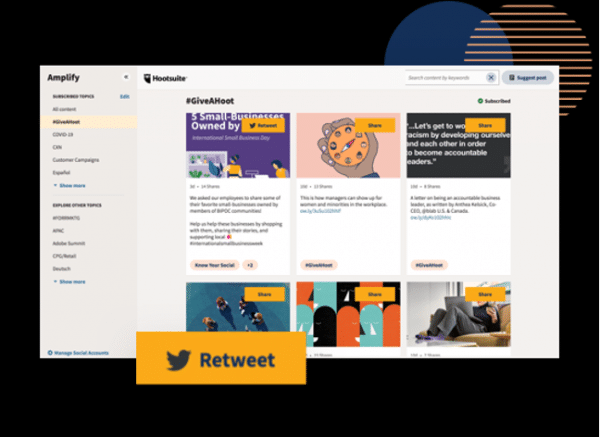
Using Hootsuite Amplify to empower employees to share content with their friends and followers.
Hootsuite also permits ease of management in interactions on Instagram with Panoramiq Multiview — this allows you to monitor and respond to comments, mentions and photo-tags all in one stream.
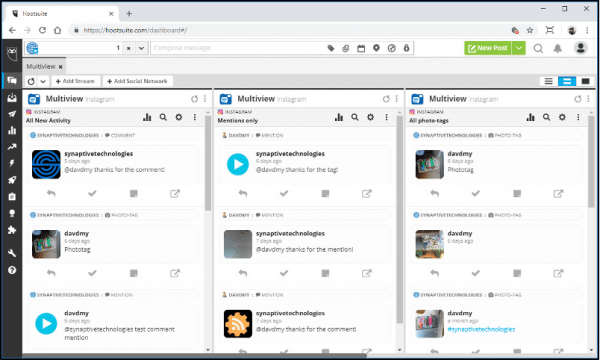
Paroramiq provides a convenient 360-degree view of Instagram activities within Hootsuite.
Finally, Hootsuite has a professional plan that offers a free 30-day trial, allowing businesses to try its services and features before committing to pay for its service.
4. Cyfe
Cyfe is another analytics tool you should consider. It features one of the most intuitive user interfaces amongst the other social media management and analytics tools.
Cyfe boasts a social media dashboard that helps to track:
- Facebook likes, comments, and reach
- Monitor tweets and Twitter followers
- LinkedIn followers by observing interactions and impressions.
- By focusing on Instagram photos and followers
Optimising a suitable tool that has a consolidated dashboard for each social media channel may be like finding a needle in a haystack. There is an abundance of social media analytics tools in the market but there are not many featuring a seamless user experience. Nevertheless, you can also check out some Cyfe alternatives and compare the differences in their functionalities to find the best one for your needs.
To provide a seamless workflow between Cyfe and the various social media channels including Facebook, YouTube and Twitter, it has several dedicated dashboards that allow monitoring of the metrics in real-time. This makes the preparation of management or client reports on a monthly and annual basis extremely fuss-free.
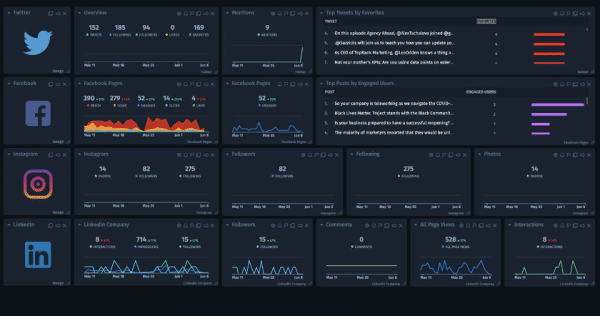
Cyfe’s consolidated dashboard that monitors all the social media analytics of a business.
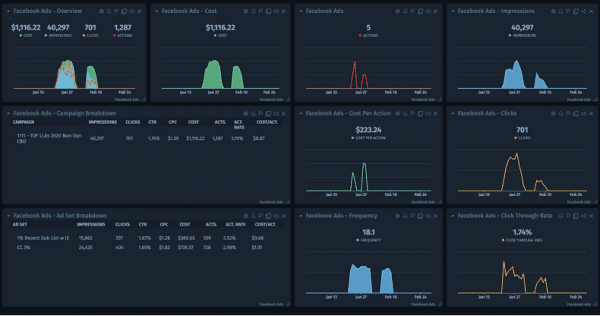
Cyfe’s master dashboard that analyses Facebook campaigns, ad sets, ads and engagement metrics to boost return on investment (ROI).
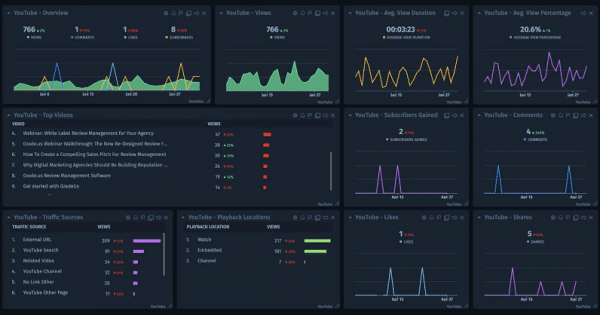
Cyfe’s centralised dashboard, that displays YouTube channel performance having key metrics like views, average time duration, and average view percentage.
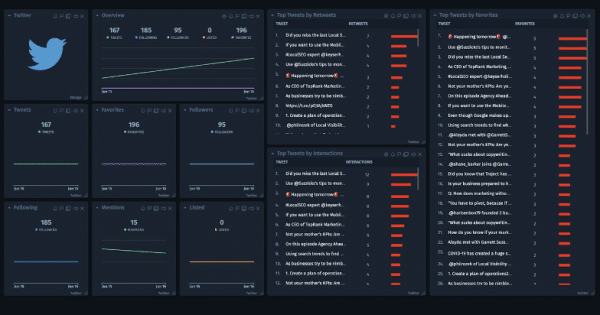
Cyfe’s integrated dashboard, that tracks the highest performing tweets, retweets, follower growth, favourites, mentions, and more.
To top it off, Cyfe has 4 pricing plans for you to choose from and allows you to get started with a free 14-day trial period.
5. Brand24
Brand24 is a robust social media monitoring and analytics tool designed to offer businesses real-time insights into their online visibility. By tracking brand mentions across social media, forums, blogs, and news sites, Brand24 helps organisations stay connected with their audience while analysing sentiment and monitoring trends.

Key features, such as influencer identification, competitor benchmarking, and comprehensive reputation management, make it ideal for businesses aiming to strengthen customer engagement and gain actionable, data-driven insights.
Brand24 offers 4 different price plans and allows for a free 14-day trial.
6. Keyhole
Keyhole is a hashtag analytics tool for these social media platforms – Twitter, Instagram and Facebook.
It excels in these four areas:
- Assisting you to understand your customers better
- Simplifies reporting
- Reveals which content attracts your consumers’ attention most
- Being efficient — you do not need to toggle across the different social platforms to analyse your social analytics
Beyond this, Keyhole also generates ready-to-print PDF reports based on your social campaign’s performance.
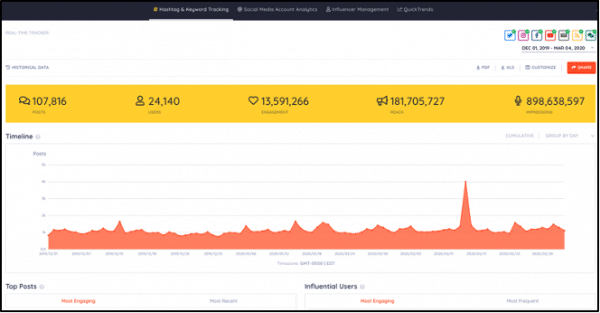
The user-friendly dashboard, that displays the latest data every time.
It further provides data on various campaign’s metrics and performance, helping clients realise their social media marketing goals for hashtag-oriented campaigns.
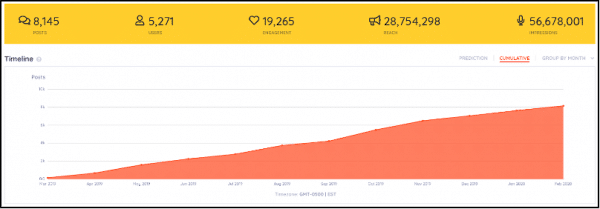
Diagram displaying common metrics like the number of engagements and reach across a specified period of time.
Additionally, it enables ease of tracking among relevant influencers — these are accounts that have performed well in getting higher engagements (reactions, likes, shares, retweets, or saves) on their posts, tweets and images.
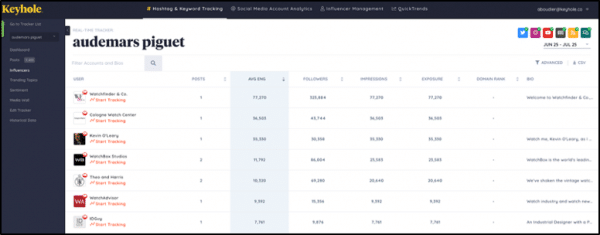
Chart representing helping brands to locate relevant influencers by gauging the average engagement with their followers.
Keyhole also conducts an in-depth sentiment analysis of social media posts over a period of time.
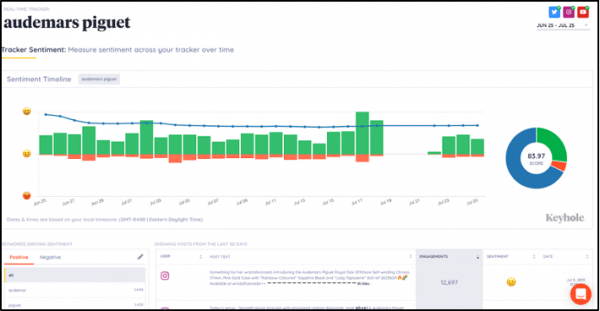
Visual representation of keywords driving sentiment by analysing both positive and negative sentiments across a period of time.
Keyhole features 4 pricing structures. Custom pricing is more suitable for large organisations that work with influencers or leverage consumer insights to make critical decisions.
7. Sprout Social
This tool is extremely useful for brands that handle multiple social media platforms and channels. Sprout Social analyses cross-channel social media analytics by tracking and measuring the health and success of your entire social strategy. It effortlessly extracts actionable insights by leveraging its comprehensive toolset.
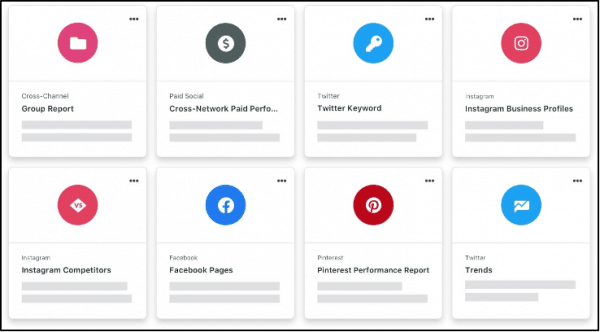
Representation on ease of onboarding with the familiar interface of Google Cards Style design.
In addition, it displays an overview of all the connected social profiles from one location.
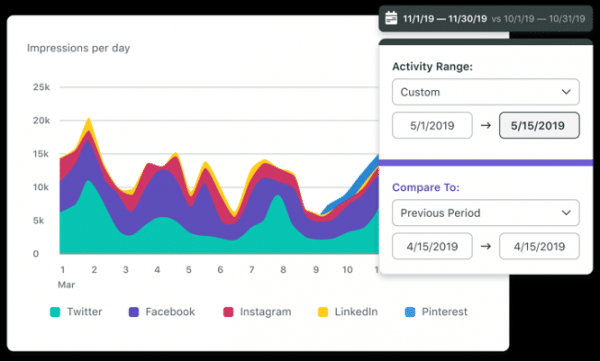
Coloured charts displaying the performances of the various social media channels across a period of time.
More often than not, social media analytics tools may fall short of delivering key actionable takeaways. However, Sprout Social succeeds in presenting the relevant metrics in a concise format. This helps businesses to effectively strategise both paid and organic campaigns by easily accessing publishing and engagement tools.
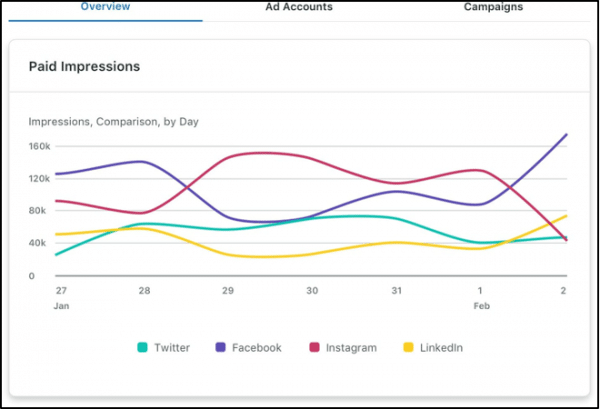
A diagram that depicts insights such as paid impressions which let businesses target the right social channels, maximising the impact of the ads.
With Sprout Social, you can gain a competitive edge by understanding the performances of your competitors and exploring new opportunities — it does this by showing you the specific posts that perform best.
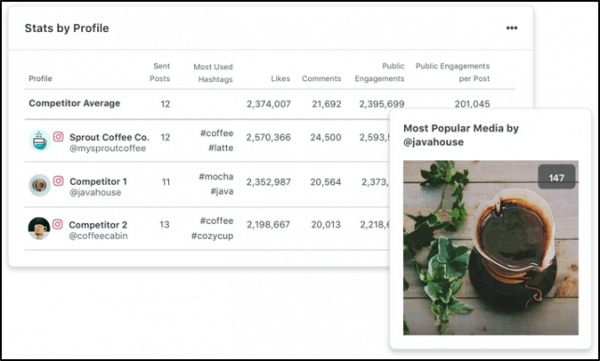
A chart showing research on competitors by analysing historical data and benchmarking results.
Moreover, Sprout Social offers 3 different price plans, together with the option to opt for a free 30-day trial.
8. HubSpot
As a marketing automation site, HubSpot integrates your social media marketing activities with the downstream activities on your website, emails and other platforms. It assists you in associating your social media performance with revenue growth.
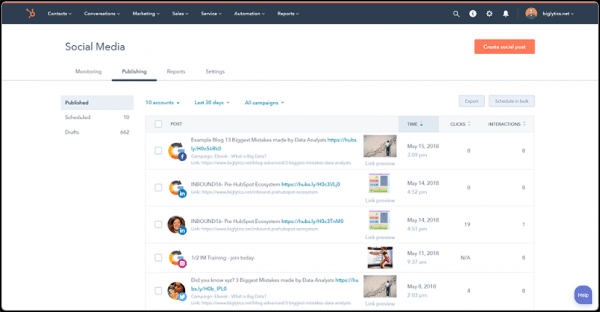
A comprehensible dashboard that gives a comprehensive overview of the previous postings and the number of interactions involved.
HubSpot possesses an integrated publishing management application that publishes to various social networks and allows you to optimally schedule content at the best times to gain the most impressions.
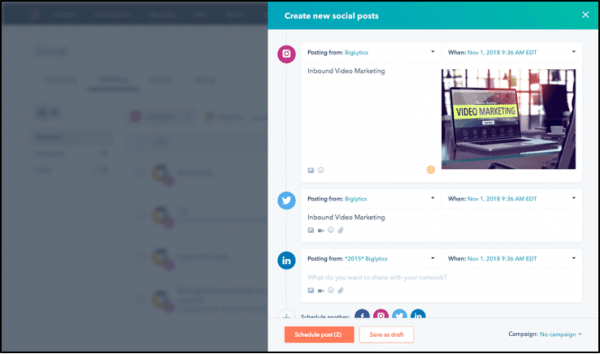
Publish to different social networks all within one consolidated interface.
The tool also monitors every social mention and is capable of creating custom keyword monitoring streams to highlight interactions.
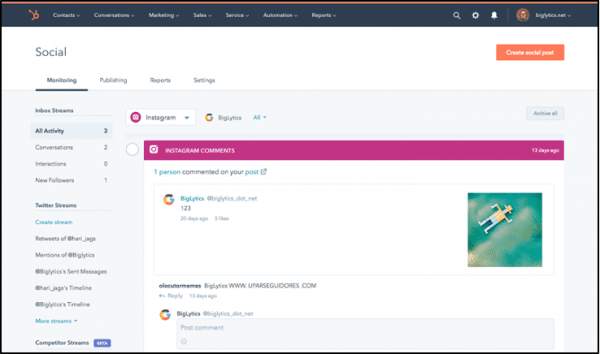
Activity monitoring within HubSpot’s Inbox Streams.
Moreover, it has the ability to inspect reports to easily compare the performance among different platforms, campaigns, and publishing times across the funnel.
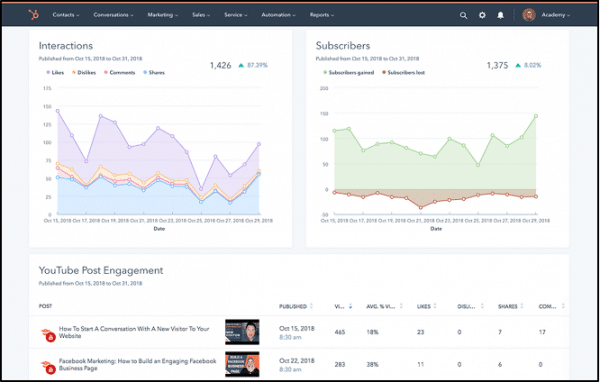
Analysing YouTube Reports to understand the target audience’s engagement with the video content. This helps to fine-tune the brand’s video strategy.
HubSpot has several pricing plans with free features to have you started on generating and emailing new leads.
9. Agorapulse
Agorapulse demonstrates seamless social media management by helping to identify better performing content for a brand. This helps in pinpointing content that has a higher engagement with the customers. It has an array of options from scheduling, rescheduling, to bulk upload of posts.
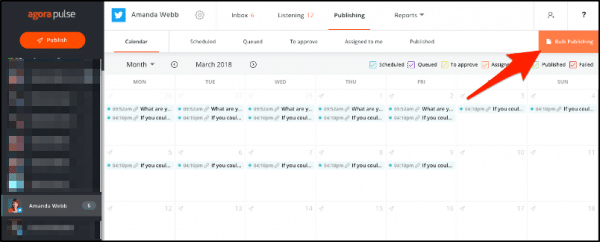
Simplifying the publishing process by incorporating bulk publishing into your workflow.
You can maintain control over complex social campaigns here, thanks to its ability to integrate granular scheduling with columns such as times and dates to your CSV file.
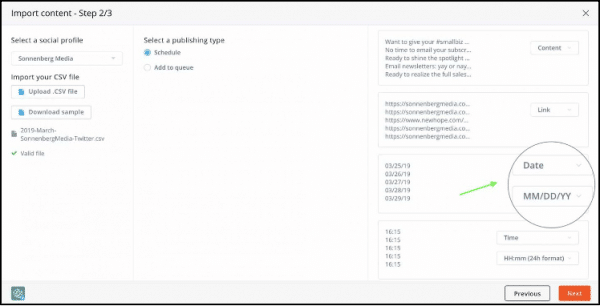
The convenience of having the system publish at the required dates and times without having to manually input a schedule for each post.
Furthermore, it allows you to review and modify individual posts before incorporating them into the schedule or queue. This provides control to the user in the form of either proofreading captions of the various posts or swapping links and images for Twitter Cards.
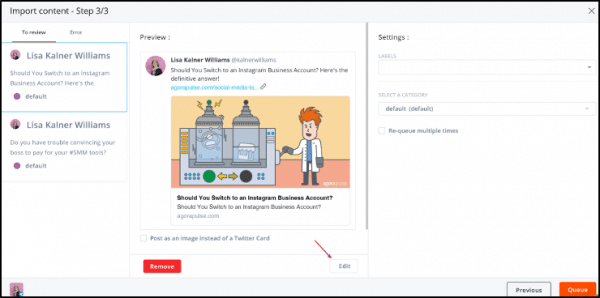
The ability to edit within the bulk publishing workflow ensures that every tweet looks just right before it goes live.
It also consolidates all your conversations in a single place for all your different social media profiles — this makes it more convenient to reply, review, assign, or label them. This can be very effective and efficient for brands that need to interact extensively with their potential customers on social media.
Lastly, it enhances synergistic relationships and team collaboration by:
- Allowing members to review and respond to inbox messages from different social media channels
- Assigning different user roles to team members for various social media tasks
- Allowing team members to check whether their team members have started to take action
- Having colour-coding of the publishing calendar for easier identification of the content approval status
- Providing a shared calendar of scheduled content that clients can easily review, accept, reject, and give feedback
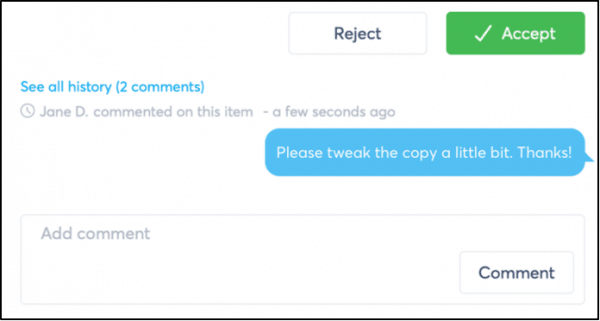
Clients can post comments and give feedback to enhance workgroup collaboration.
Agorapulse showcases 4 pricing plans and lets you get started with a free 28-day trial period.
10. Oktopost
Oktopost is a social media management tool dedicated to B2B marketing. It helps to manage, monitor and measure social media activities so that users can achieve specific social media marketing goals.
It presents a real-time overview of all the scheduled and published content across multiple networks by utilising the social media calendar tool. This allows users to plan their content in advance, and to space out their content creation and publishing activities.
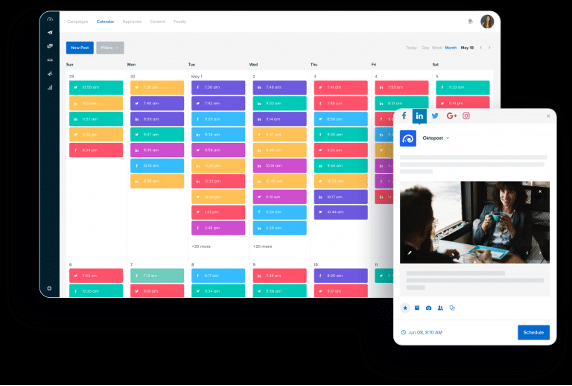
Scheduling of content to output to different social media channels.
Oktopost also provides insights into engagement, conversions and ROI to help in evaluating a brand’s social media strategy.
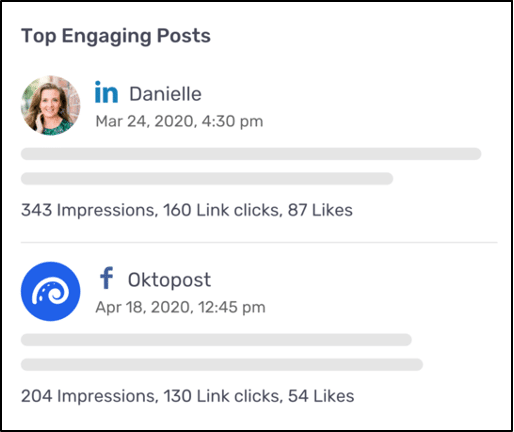
Tracking and measuring the performance of every post, network, and campaign to ascertain the achievement of the marketing goals.
Finally, Oktopost helps you to analyse the impact of specific posts, channels, and campaigns to determine which social activities drive growth.
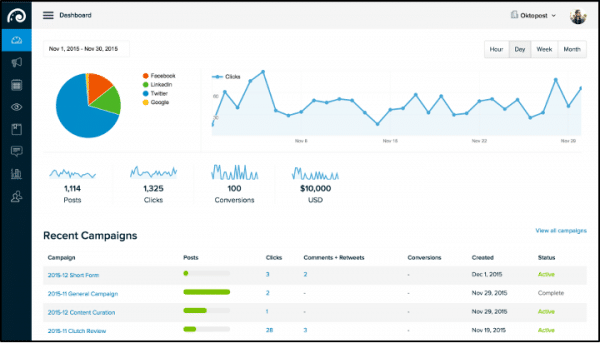
It has an interactive dashboard that displays the status of the campaign.
Content curation is made easier by discovering and sharing news and insights from social media, emails, and even newsletters without leaving Oktopost.
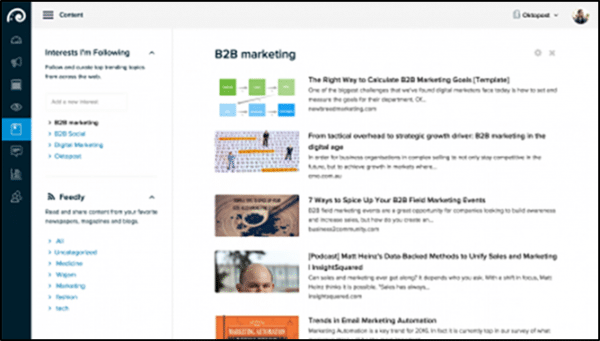
The convenience of transferring the information to your Social Media Management platform either by RSS feeds or using a content discovery tool helps keep content updated at any given moment.
Ending Thoughts
In conclusion, there is no one-size-fits-all tool. You are encouraged to try out the free or trial versions of these top 10 social media analytics tools to see which works best for you.
Do conduct experiments in order to choose the tool that best suits your business needs. Before investing in any of these tools, ensure that you have a sound and basic understanding of social media analytics on their respective platforms — Facebook, LinkedIn, YouTube, Instagram, Twitter and others.
In addition, you should bear in mind that most of the social media analytics tools are not cheap and have an ongoing subscription cost. Hence, do consider carefully if they are genuinely useful for your business objectives before you sink in your funds. With that said, utilising these tools can increase the odds of success in your social media marketing campaigns.
Tools alone are not enough. You need to build an effective social media marketing framework to enjoy sustained success in your marketing plans. We also recommend you to deploy the 6 steps of implementing a successful social media marketing strategy if you intend to tap on social media marketing as a digital marketing strategy.
Intrigued and interested to find out more? Sign up for our Social Media Marketing course to be well-equipped with the fundamental frameworks, concepts and tools required to succeed in social media. You can also browse and sign up for the other digital marketing courses held in-person in Singapore or online, which cover the remaining five core modules in Equinet Academy’s Digital Marketing Curriculum.
At Equinet Academy, the remaining five core modules of Digital Marketing include:
- Digital Marketing Strategy
- Content Marketing Strategy
- Search Engine Optimisation
- Digital Advertising
- Digital Marketing Analytics with Google Analytics